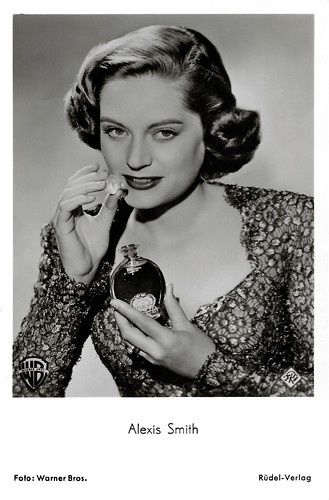
West German postcard by Rüdel-Verlag, Hamburg-Bergedorf, no. 810. Photo: Warner Bros.
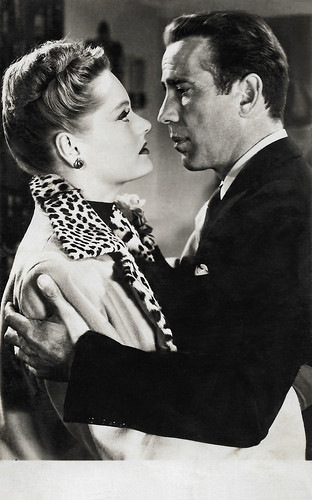
Spanish postcard, no. 1260. Photo: Warner Bros. Alexis Smith and Humphrey Bogart in The Two Mrs. Carrolls (Peter Godfrey, 1947).
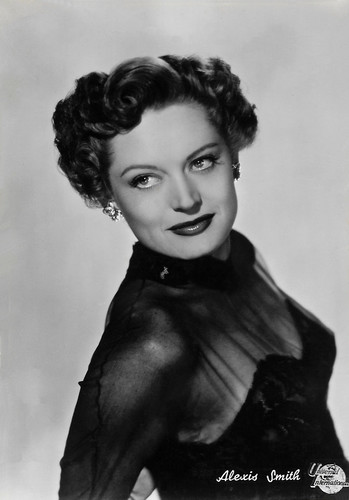
Italian postcard by Bromofoto, Milano, no. 296. Photo: Universal International. Alexis Smith in Undercover Girl (Joseph Pevney, 1950).
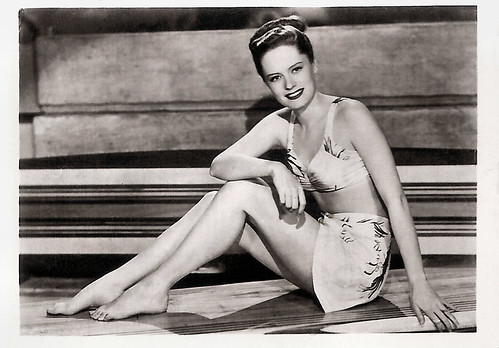
Small German collectors card in the series E - Filmstars der Welt 2. Band by Greilings-sammelbilder, no. 164. Photo: Hamann-Meyerpress.
The mould of the other woman
Alexis Smith was born Gladys Smith in 1921 in Penticton, British Columbia, Canada. After her family moved to California, she grew into a precocious talent, performing ballet in public by the age of thirteen, dancing to 'Carmen' at the Hollywood Bowl. She later graduated with a degree in drama from Los Angeles City College, having previously won an acting contest whilst still in high school.
During a performance of a play on campus, she was spotted by a Warner Brothers talent scout and signed a contract in 1941. Her earliest film roles were uncredited bit parts, and it took several years for her career to gain momentum. Much to her chagrin, the studio's publicity department touted Alexis as the 'Dynamite Girl'. Her first credited role was in the feature film Dive Bomber (Michael Curtiz, 1941), playing the female lead opposite Errol Flynn.
She would make a total of four films with Flynn including the boxing drama Gentleman Jim (Raoul Walsh, 1942) and the Western San Antonio (David Butler, 1945). Though decidedly second fiddle to the action and the charismatic Flynn, Alexis made a good first impression as the fetching romantic interest. She appeared with her future husband, Craig Stevens, in the comedy Steel Against the Sky (A. Edward Sutherland, 1941).
Her appearance in The Constant Nymph (Edmund Goulding, 1943) opposite Charles Boyer, was described by a reviewer as an "intelligent rendition". It led to bigger parts. Her biggest hit of the mid-1940s was as Cole Porter's wife in the inaccurate but hugely successful biopic Night and Day (Michael Curtiz, 1946), starring Cary Grant. Until the early 1950s, she was paired with the top male stars in Hollywood.
She appeared in two Film Noirs with Humphrey Bogart at his most menacing: the interesting and underrated Conflict (Curtis Bernhardt, 1945) and the excellent The Two Mrs. Carrolls (Peter Godfrey, 1947). As Clark Gable's wife in the gambling drama Any Number Can Play (Mervyn LeRoy, 1949), she was critically lauded as "genuinely appealing". In between there were also some conspicuous failures, particularly her somewhat stolid performance in the period drama The Woman in White (Peter Godfrey, 1948). Stylishly attired by costume designers like Milo Anderson and Helen Rose in the most glamorous gowns, Smith also proved to be a capable and spirited actress, despite relatively few opportunities to break out of the mould of 'the other woman'.
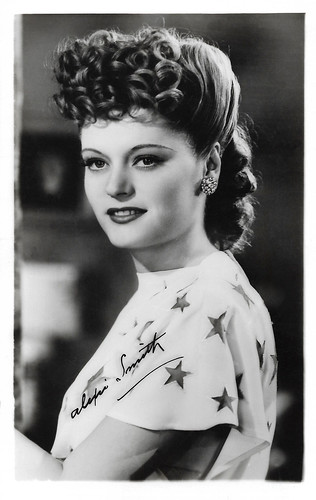
American postcard by EKC. Photo: Warner Bros.
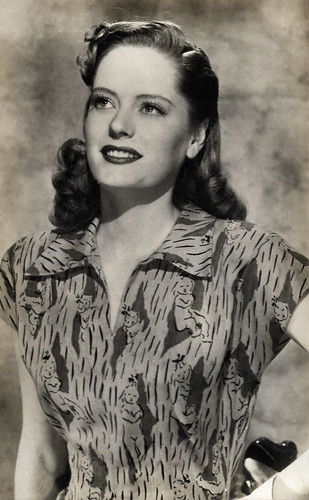
Spanish postcard by C.M.B., no. 106. Photo: Warner Bros.
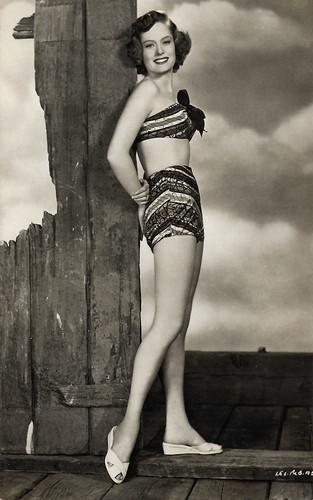
Vintage postcard. Photo: Warner Bros.
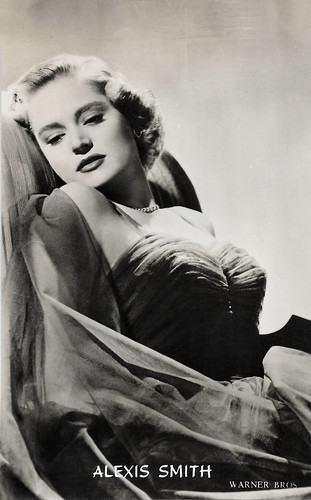
Vintage postcard. Photo: Warner Bros.
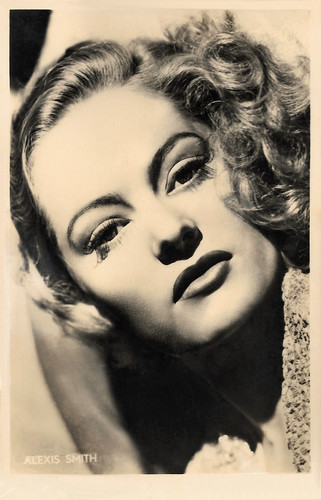
Dutch postcard by J.S.A. Photo: Warner Bros. / M.P.E.
A sabbatical from the screen
While Alexis Smith claimed in later years to have typecast herself during her Hollywood heydays, and that few of her assigned roles ever challenged her on any level, she frequently enjoyed good critical reviews for many of her performances. She was also popular with directors and film crews, who appreciated her relaxed, professional manner on the set.
Smith had little to do in Here Comes the Groom (Frank Capra, 1951) and The Turning Point (William Dieterle, 1952) and her best part in the 1950s, though small, was that of Carol Wharton in The Young Philadelphians (Vincent Sherman, 1959).
During the 1960s Alexis took a sabbatical from the screen to appear on stage with her husband, actor Craig Stevens (her marriage, a rare Hollywood success, lasted 49 years) in 'Critic's Choice', 'Cactus Flower' and 'Mary, Mary'. She reserved her best acting for the stage, becoming the Tony Award-winning star of Stephen Sondheim's musical 'Follies', in which she played Phyllis during the 1971 run on Broadway and at the Shubert Theatre in Los Angeles in 1972.
In 1973 she played Sylvia Fowler in a revival of Clare Boothe Luce's 'The Women' and was nominated for another Tony for her leading role of Lila Halliday in 'Platinum' in 1979. On television Alexis was seen infrequently from the mid-1950s, sometimes appearing on the same show opposite her husband. She had a recurring role as the homicidal Lady Jessica Montfort in Dallas during the 1984 and 1990 seasons and was nominated for an Emmy for a guest-starring role on Cheers (1982).
Outside the US, she appeared in the French-Canadian thriller The Little Girl Who Lives Down the Lane (Nicholas Gessner, 1976) with Jodie Foster, and in the French film La truite (Joseph Losey, 1982), starring Isabelle Huppert. In her last film, The Age of Innocence (Martin Scorsese, 1993), she was cast as a New York socialite, a type of character she had portrayed frequently in her heyday at Warners. Alexis Smith died in 1993 in Los Angeles of brain cancer.
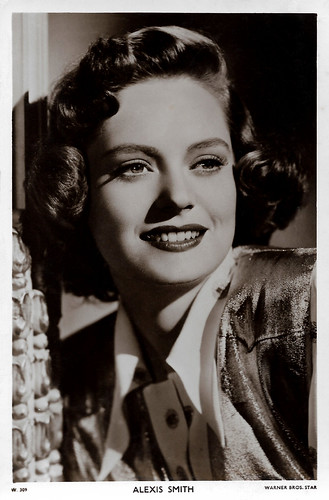
British postcard in the Picturegoer Series, London, no. W 309. Photo: Warner Bros.
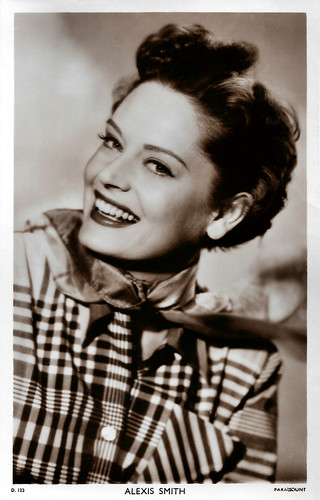
British postcard in the Picturegoer Series, London, no. D 123. Photo: Paramount.
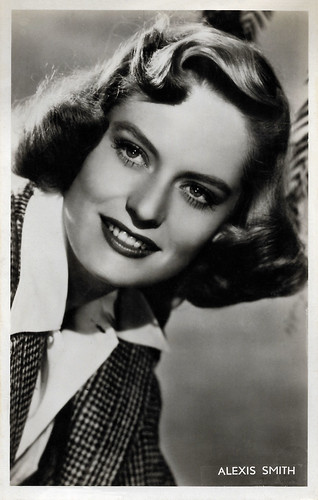
Dutch postcard by J. Sleding N.V., Amsterdam, no. 17 fL. Photo: Warner Bros.
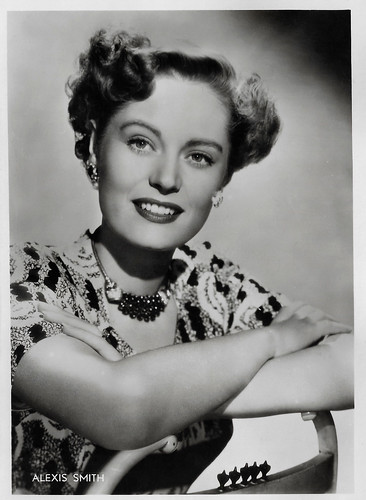
Dutch postcard by P.F. Claddér, Amsterdam, no. 4C-14. Photo: Warner Bros.
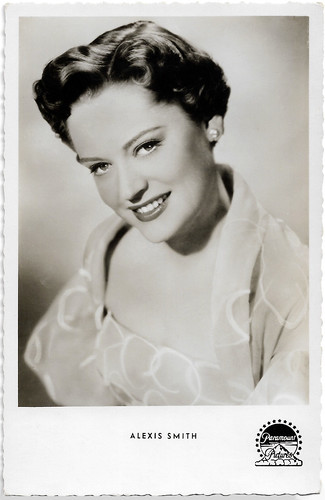
West German postcard by Kunst und Bild, Berlin W., no. A 362. Photo: Paramount. Alexis Smith in Here Comes the Groom (Frank Capra, 1951).
Sources: I.S. Mowis (IMDb), Wikipedia and IMDb.
No comments:
Post a Comment